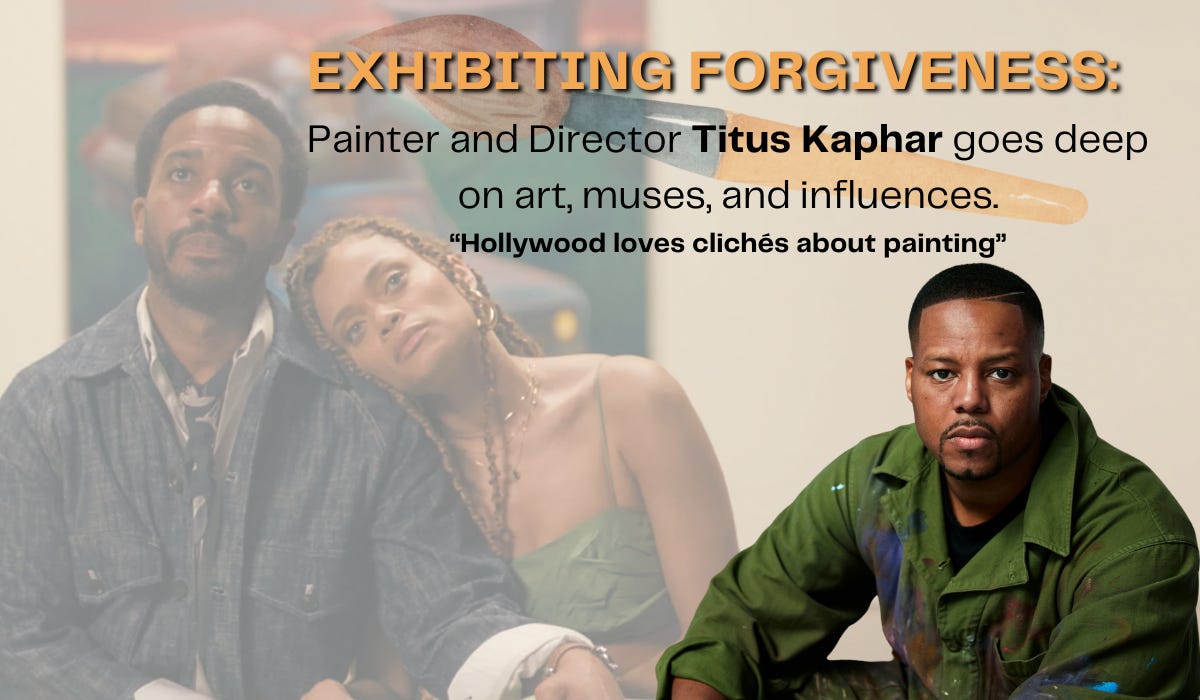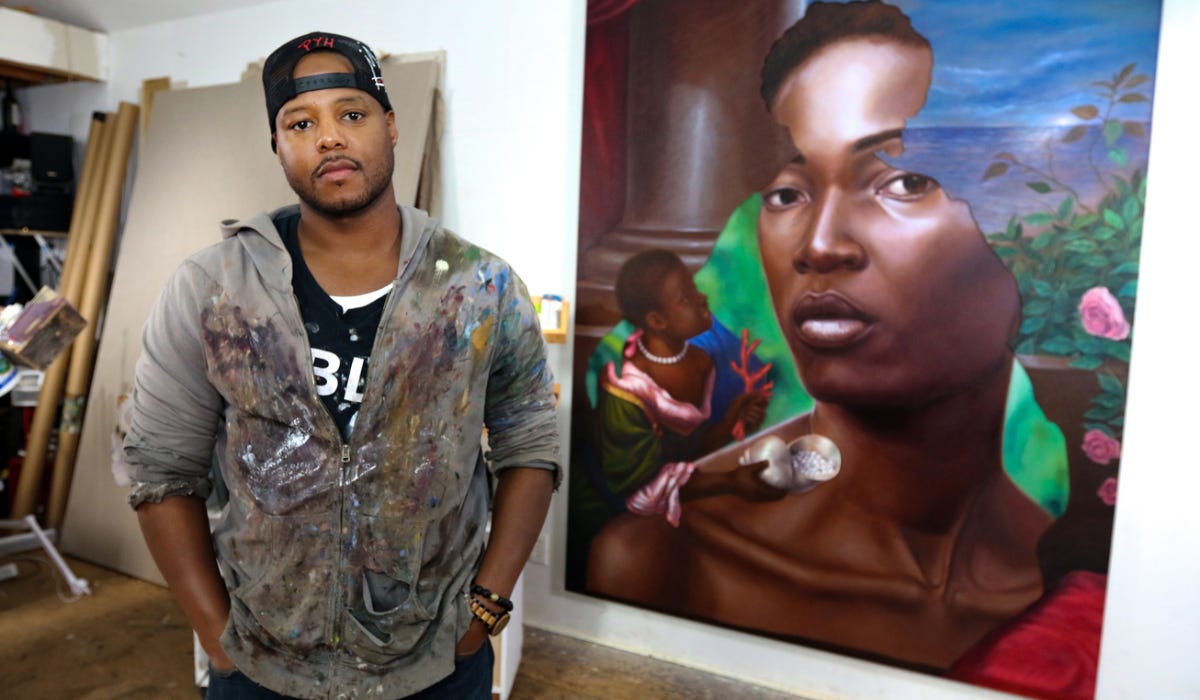Weekend Read: How to 'Exhibit Forgiveness' with Artist Titus Kaphar
The first-time director opens up about his impactful new film: "Hollywood loves clichés about painting."
Thanks for reading The Schmear Hunter! If you like this newsletter, consider supporting it with a paid subscription: $5/month or $50 a year 🥯🎞️
This week, I had the privilege of sitting down with acclaimed artist Titus Kaphar to discuss his stunning new film Exhibiting Forgiveness. We discussed his influences, his relationship with star André Holland, what art movies get right and wrong, and some of the filmmakers inspiring him today.
Catch Exhibiting Forgiveness in theaters today.
The following interview has been edited and condensed.
Enjoy!
The Schmear Hunter: Titus Kaphar—visual artist, painter, and now filmmaker—joins me today. His new film Exhibiting Forgiveness is in theaters, and I hope readers check it out. Your artwork has a playful, magic trick quality, even with heavy subjects. Did that signal you were ready to move into filmmaking, a medium tied to magic?
Titus Kaphar: No, that’s not why I went into it. My projects are about following the Muses. If a painting says, 'Go left,' I go left. If it says, 'Go right,' I go right. And if it says, 'I want to be a movie,' I learn new skills, which is what happened here. But the magic you’re talking about—which I appreciate—did transfer over into the film, or at least I think so.
The Schmear Hunter: You screened this at SF MOMA; thank you for that. After the film, you had the audience take deep breaths together, like Tarrell does with his son. What’s the importance of breath to you, and what role does it play in your life?
Titus Kaphar: I learned these breath exercises way too late in life. I wish I’d known earlier. They’ve helped me manage anxiety and stress, just like the character in the film. He’s giving his son a different toolkit. Growing up, if I acted like the kid in the movie, there’d be punishment. But the character equips his son with better ways to handle stress and frustration, using breathwork.
The Schmear Hunter: I think that’s a great microcosm for the film and the lessons between parents and children. You’ve called Exhibiting Forgiveness not a line-for-line autobiography but 'the truth of your experience.' Could you share the genesis of the film with our readers?
Titus Kaphar: The film started as a way to share my background with my sons. My oldest, Sabian, is going to college, and I’m wrestling with that. I hadn’t told them much about my upbringing, always saying, 'I’ll tell you when you're older.' So, I started writing in the mornings and painting after drop-off. By the end, I had both a text and a body of paintings. Painting while writing felt natural, as painting is what I know, but writing and filmmaking were new.
The Schmear Hunter: So your agents weren’t saying, 'Get us a script, Titus.' This came entirely from you.
Titus Kaphar: (Laughs) No, not at all. In fact, I later found out that when I told one of my agents I was writing the script, he said, 'Everybody says that.' Then, after it was done, he called and said, 'I can’t believe it. You actually did it. You did the thing.'
The Schmear Hunter: I’d love to hear about your connection with André Holland and his commitment to the role. Can you take us back to your early conversations and how you got on the same page?
Titus Kaphar: When you’re working with actors like André, you’re not teaching them about acting—he’s been doing this a long time, and he’s excellent. As a first-time director, I focused on building a relationship. Our first conversations were about our fathers and growing up with mothers deeply invested in the church. Then I told him, 'If you want this role, you need to learn how to paint.' He accepted that challenge, and you can feel it in the film—he’s really doing the work.
The Schmear Hunter: I read that you trained side by side for three months. You taught André painting techniques—what did he teach you about performance?
Titus Kaphar: It’s amazing how many parallels there are between bringing a character to life from the page and giving life to a portrait on canvas. We talked a lot about process, and believe it or not, breathing was a big part of it. When I paint, I’m very aware of my breath, especially when making marks or cutting a painting—it’s more like surgery than violence. André talked about that connection between breath and action too.
The Schmear Hunter: Yes, he played a surgeon on The Knick.
Titus Kaphar: Yeah, exactly.
The Schmear Hunter: What you’re describing also sounds like music—syncopated beats, taking a breath, and improvisation.
Titus Kaphar: Before I started painting, I was actually a bass player. So the musicality of all this is definitely not lost on me.
The Schmear Hunter: Your artwork—and art in general—can be metaphorical and symbolic, but Exhibiting Forgiveness feels refreshingly direct. Was that clarity something you aimed for, and why was it important?
Titus Kaphar: I aim for honesty. I’ve seen many movies on this subject that don’t feel honest. One of the biggest lies is the happy ending…
To read the rest of this exclusive interview with painter and director Titus Kaphar, consider upgrading your Schmear Hunter subscription
Keep reading with a 7-day free trial
Subscribe to The Schmear Hunter to keep reading this post and get 7 days of free access to the full post archives.








